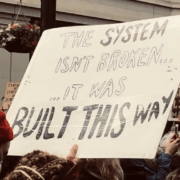The internet is our best chance at revolutionising thought

It is important that we begin to truly recognise the power of online activism in disrupting the status quo.
Contribution by Anna Yoganathan.
Instagram, Tiktok, Facebook, Twitter, memes; we are all constantly ingesting media, and this particular form of media has grown so exponentially that it has become an integral part of our daily lives. Our increasing interconnectedness has created vast global networks where ideas can spread like wildfire, and for the past twenty years, we have all been experimenting with these new parameters of human interaction. We’ve worried endlessly about how we present ourselves online, so much so that our online existence has become an accepted extension of our own identity- the absence of which is a statement in itself.
But what if we collectively aspired for something greater to come of this digital era? What if we finally started realising the space we hold within these virtual communities actually has an influence on society at large. The protests in summer triggered by the murder of George Floyd at the hands of racist police saw an unprecedented global retaliation against the violent oppression of structural anti-black racism. An estimated 26 million (according to the Kaiser Family Foundation) Americans protested in solidarity with the black community, and similar protests were seen in over 60 other countries worldwide. Social media enabled protestors to hold violent police officers to account, share educational resources about anti-racism, and coordinate the demonstrations; mobilising millions who were tired of hearing about the same injustices inflicted on the black community at the hands of the state.
While the issue of virtue signaling remains a real threat (when people performatively display their support, shirking the real work of unlearning and actively combatting racism), the impact this had in stirring up the conversation around racial injustice and informing those who truly did engage with the facts, was undeniable. Traditional media has failed us time and again when it comes to presenting the reality of the extractive, patriarchal, white supremacist, the capitalist system we live under, driving online activists to create accounts designed to counter this misinformation. Multiple profiles online now serve no other purpose than to enlighten people on matters of race, inequality, the environment, and the incompetence of politicians. Furthermore, the pandemic has cast an illuminating light on the structural inequalities at the heart of our society, with millions facing job insecurity whilst billionaires such as Elon Musk and Jeff Bezos have been able to rack up truly disgusting amounts of wealth; and this frustration with the status quo is getting harder to suppress. It was George Orwell who said that ‘He who controls the narrative, controls the people’, and to me, social media represents an opportunity for us to take that narrative back into our own hands.

Other record-breaking protests which have happened in the past few years have all relied on social media as an integral tool for organisation and mobilisation. These include the Hong Kong protests, during which two million people took to the streets to fight against Chinese hegemony and police violence, and the Delhi Farmer’s protests, which saw 125 million strikes in retaliation against government implemented measures to remove minimum support prices, acting to open the farming industry further to corporations and driving crop prices so low that many will be unable to survive. Mobilisation on this scale is routinely downplayed, making social media a key distributor of the actual facts behind the unrest, and informing people of worldwide displays of solidarity which both empower protestors and draw much-needed attention to the issues at hand.
Another exciting frontier of the internet, further demonstrating its potential to challenge oppressive systems, is in the visibility of the LGBTQ+ community on platforms such as TikTok. Conversations centering queer culture previously found an outlet via Tumblr, where many who faced prejudice in their everyday lives were able to cultivate a space of acceptance and empowerment. This has now graduated to the medium of video, and despite claims of anti-LGBT censorship, the queer TikTok community is alive and thriving. Exceeding this, conversations routinely welcome an examination of intersectionality, gender non-conformity, and anti-trans bigotry. For the most part, Gen Z is coming of age with an increasingly nuanced understanding of issues such as race, class, sexuality, and gender identity, which the majority of us have yet to catch up with.
All this said I think it is important that we begin to truly recognise the power of online activism in disrupting the status quo. However, activism isn’t only limited to those we deem worthy enough to be called ‘activists’. Activism thrives at a grassroots level, and with each of us holding space in our own unique networks, we need to realise the influence that we have as individuals. Passivity is no longer an option; do the work, accept your weaknesses, and speak out about matters of injustice- there is so much more to be fought for than empty likes and a good follower ‘ratio’.
Contribution by Anna Yoganathan.
Check out the GUAP Arts & Culture section, to discover new art, film, and creative individuals.





![ZINO VINCI’S ‘FILTHY & DISGUSTING’EP BRINGS YOU TO THE CORE OF THE ARTIST [@ZinoVinci]](https://guap.co/wp-content/uploads/2023/10/Zino-4.jpg)





![Remel London’s [@Remel_London] “Mainstream” is a must attend for upcoming presenters!](https://guap.co/wp-content/uploads/2017/02/REMEL-LONDON-FLYER-FINAL-YELLOW-COMPLETE-1.png)